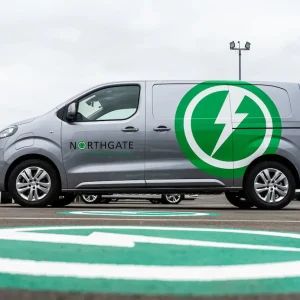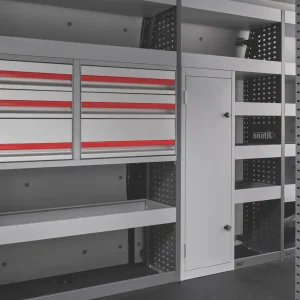Despite all the ballyhoo and razzamatazz surrounding Ford’s launch of the new Transit Custom and the arrival of Mercedes-Benz’s Citan, UK van sales look unlikely to boom in 2013, according to some manufacturers and industry experts.
“I don’t anticipate a major expansion in registrations,” says Phil Robson, director of fleet and used vehicle operations at Peugeot. “They’ll be about the same as 2012’s total with perhaps a slight dip.
“We reckon we’ll sell 21,000 to 22,000 light commercials in 2013, including perhaps 1700 motorhome chassis, compared with approximately 21,500 in 2012.”
“We’re expecting the market to be flat,” says Scott Michael, head of commercial vehicles and the business centre programme at sister company Citroen. “It will be similar to the way it was last year.”
“Light commercial vehicle sales are a barometer for the economy so we reckon they’ll be around the same in 2013 as they were in 2012,” agrees Ford sales director, Andy Barratt. “For us that means 70,000 registrations, the same as we achieved in the previous year.”
“I reckon 2013 will be pretty similar to 2012,” adds Dave Freeman, manager of the commercial vehicle specialist division at leasing company Alphabet.
Fiat Professional UK director, Sebastiano Fedrigo, is, however, more optimistic than many of
his colleagues.
“I think registrations in 2013 will start slowly then gradually increase as the year goes on,” he predicts. “We may see them grow by around 3%.”
Another person who is more hopeful is Sandy MacRitchie, Vauxhall’s marketing manager, commercial vehicles. “The Eurozone crisis rumbles on and that, of course, affects customer confidence, but we’re quietly optimistic about 2013,” he says, while VW Commercial Vehicles director, Alex Smith is “forecasting a very slight increase in total industry volume”.
Negative outlook
Their modestly positive stance is supported by the Society of Motor Manufacturers and Traders. At the time of writing it was predicting a 3.2% rise in registrations from 2012’s total of 240,000 to around 250,000 in 2013 then rising to between 260,000 and 262,000 in 2014, bringing registrations back up to the level of 2011.
However, Renault sales director, Darren Payne, offers a countervailing view. “I believe registrations will decline by up to 5% based on what we’ve seen over the past 12 months,” he comments.
It is an opinion shared by Matt Dale, national light commercial vehicle sales manager at sister firm Nissan. “I think demand will drop by between 4% and 5%,” he observes.
“All in all it will be another tough year, but things should start to head more in the right direction in 2014,” he continues. “And in 2013 I will still be looking for double-digit growth for Nissan even in a falling market.”
With the electric version of the NV200 set to debut in the UK he is, not surprisingly, hoping for increased registrations of battery-powered vans while recognising that they are unlikely to rocket skywards.
“I think, however, that they will be a growing presence on the streets as more and more operators realise they are serious working tools,” Dale states. “Admittedly they are only suitable for certain applications, but businesses have yet to appreciate just how many applications they will actually fit.”
Robson is hoping fortune will favour the electric Peugeot Partner, which is set to arrive in May. He too is realistic about the sales potential of battery light commercials while pointing out that they can be ideal for urban businesses on short-haul local delivery work.
“So far, sales of our electric Kangoo Van Z.E have been lower than we’d hoped for,” adds Payne. “They’ll grow, but it will take time.”
Alphabet’s Freeman, however, wonders how many more false dawns electric vans can stand, and remarks that he is “not seeing a big uptake among our customers”, while any interest in electrics is unlikely to eclipse what Michael anticipates will be growing demand for low-CO2 diesel models such as the Airdream version of the Citroen Berlingo.
Will 2013 see more companies switch from 7.5-tonners to 3.5-tonners where possible and practical in order to rid themselves of all the rules and regulations that come into force once you breach the 3.5-tonne barrier? “I think that’s a definite market trend,” says Ford’s Barratt.
“Some businesses have already started to move down to 3.5 tonnes but those that are doing so should not make the mistake of overloading them because the enforcement authorities are watching,” Dale warns. Cut it how you like, a 3.5-tonner cannot carry as much weight as a 7.5-tonner, although it is not quite so far behind in terms of load space.
“Switching to a 4.5-tonner instead may make more sense for some companies,” Dale suggests. You are still within a tight regulatory net, he agrees, but your fuel economy will be better than anything a 7.5-tonner can achieve.
“VW Crafter sales have been growing by as much as 29% and a proportion of that increase is a result of downsizing to 3.5 tonnes,” says Smith. He agrees, though, that some fleets running 7.5-tonners could benefit from dropping down to, say, 5.0 tonnes, again on fuel economy grounds. TNT Express is running a number of 5.0-tonners, including Crafters, on parcels work usually tackled by 7.5-tonners and is seeing a near-50% cut in consumption.
“Something else we may see in 2013 is more firms considering switching from mid-sized panel vans such as the Nissan Primastar (a rebadged version of Renault’s Trafic and Vauxhall’s Vivaro) to more compact models like the NV200, again with economy in mind,” Dale says.
“By the same token we might see some operators switching from the VW Transporter to the Caddy/Caddy Maxi, but it should never be forgotten that the Transporter has a strong image and is an aspirational product with healthy RVs,” says Smith: sound reasons for customers staying loyal to the Transporter even though a slightly smaller vehicle might suit them just as well.
“One thing we’re certainly witnessing is a rise in sales of combi versions of the Transporter,” Smith continues. In an age of austerity, some tradespeople who might previously have run a van and a car are instead acquiring one vehicle that will do the job of both, he says – a trend likely to continue over the next 12 months as economic growth remains sluggish. Such thinking could also help to boost sales of double-cab 4×4 pick-ups, which can be used as a car as well as a commercial. “We’re getting huge interest in our latest Ranger and we reckon that sector of the market will increase significantly in both 2013 and 2014,” says Barratt.
Fiat’s Fedrigo believes fleet demand will drive much of the market in 2013. “Small businesses and the self-employed are still a bit cautious about committing themselves,” he says.
“Fleet sales will be absolutely key in 2013 and we’re going to focus on growing our fleet business,” agrees Barratt.
“I think the large fleets will continue to acquire vehicles but it will be interesting to see how long small businesses will stay out of the market,” says Robson from Peugeot. “As the cost of maintaining their existing vans begins to rise then they may feel they’ve got no choice but to come back in.”
If they do then they may increasingly choose contract hire as an acquisition route in order to preserve their cash flow. Michael reports that 50% of vans supplied to small- to medium-sized operators through Citroen’s business centres are being funded through Citroen Contract Motoring, the manufacturer’s leasing arm.
“We’re seeing more small businesses opt for contract hire as opposed to outright purchase,” says VW’s Smith. “In the current climate they want to hang on to their capital.”
“More and more van operators are open to the idea of contract hire,” says Mercedes-Benz van sales and marketing director Steve Bridge. After all, there are other items they use regularly that they don’t own outright. “How many people own their mobile phones?” he wonders.
“If you’re a firm running no more than, say, five vans then forging links with one of the big contract hire companies is going to give you access to a lot more buying power than you are ever going to enjoy on your own,” says Freeman of Alphabet.
Alternatively, small firms may opt to take a van on a long-term rental agreement until they are more certain about the direction the economy is heading in. If there is another downturn then they can simply hand back their rental vehicle without being penalised.
They may, of course, decide to buy second-hand points out auctioneer BCA, which is “looking forward to a strong, healthy used van market in 2013”.
However, if it’s a new van you’re after, then 2013 is a buyer’s market.
“It’s a brilliant time if you’re a customer, so shop around,” Bridge advises. “But when you’re looking at the product don’t forget to ask about the aftermarket back-up too.”





